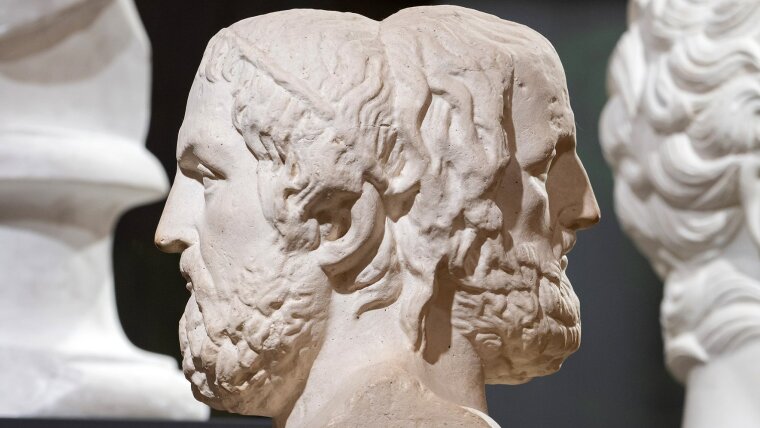
- Event
- Knowledge Transfer and Innovation
Published: | By: Stephan Laudien
What did the Roman emperors look like? What hairstyles did the empresses wear? How were Greek poets and thinkers portrayed? Visitors can find answers to these and many other questions at the exhibition “Hall of Fame. Ancient Portraits in Focus”, which will be on display at the Institute of Classics (Fürstengraben 25) at Friedrich Schiller University Jena from 1 February to 12 July 2024.
“We are tracing the development of ancient portraiture by way of example and showing a selection of Greek portraits through to imperial portraits from the 3rd century AD,” says Dr Anne Gürlach, who is curating the exhibition as a research assistant at the Chair for Classical Archaeology. The idea and concept were developed together with students in a course. The exhibition will be opened on Wednesday, 31 January at 6 pm. Prof. Eva Winter, who holds the Chair for Classical Archaeology, and Dr Anne Gürlach will give introductory remarks at the opening.
No portraits of women in the Jena antiquities collections
“The invention of the round sculptural portrait to depict historical figures is one of the great achievements of Greek art,” says Dr Anne Gürlach. While the bronze statues of archaic and classical times primarily depicted deities, it was not until the 5th century BC that famous historical figures were depicted in marble. The Romans copied these models frequently and extensively developed the art of portraiture further to depict their own contemporaries – now not always in the form of full-sized statues, but as round sculptural heads and busts. In the new exhibition organized by the Chair for Classical Archaeology, mainly plaster casts of these ancient portraits are on display; the pieces are part of the collections of the University of Jena, supplemented by loans from the Leipzig University. “Curiously, there are no historical portraits of women in the Jena collection,” says Anne Gürlach. Plaster casts of ancient sculptures became very fashionable in Europe in the 19th century – when many of the Greek originals and their Roman copies were already scattered across numerous museums. “There are exciting stories to tell about the individual exhibits,” says Anne Gürlach. For visitors to the exhibition, tablets or audio guides are available for additional information, with texts on the individual artefacts recorded by students from the accompanying introductory seminar. In this way, visitors learn interesting facts about the creation of the portraits, their reception history and, of course, about the people depicted.
Assigning the portraits is not always easy
As a “Hall of Fame”, the exhibition brings together great names of the ancient world, including Homer and Sappho, Pericles, and Caesar as well as Augustus and Cleopatra. “It is not always certain to what extent it is actually a realistic depiction of the respective person or whether the attribution is correct,” says Anne Gürlach. While the attribution of some portraits, such as those of Alexander the Great or the Roman emperors, is confirmed either by contemporary coinage or by inscriptions of names, it remains uncertain for other portraits even after years of research. In the exhibition, the ancient portraits are grouped thematically and chronologically and are complemented by original everyday objects from the lives of the people portrayed; maps and a timeline make it easier for visitors to find their way around the “Hall of Fame”.
Under the motto “From the field to the web – experiencing antiquity digitally”, current and completed research and educational projects of the Jena Chair for Classical Archaeology will be presented to accompany the new special exhibition: 3D models, orthophotographs, digital exhibitions, audio guides and a podcast provide examples of the topics and content of the subject.
The exhibition "Hall of Fame. Ancient Portraits in Focus" will be on display from 1 February to 12 July. It is open on Thursdays from 12 to 2 pm, Fridays and Saturdays from 1 to 5 pm. There are themed tours of the exhibition every Saturday from 3 to 4 pm. Admission is free, further guided tours for groups can be arranged here de.